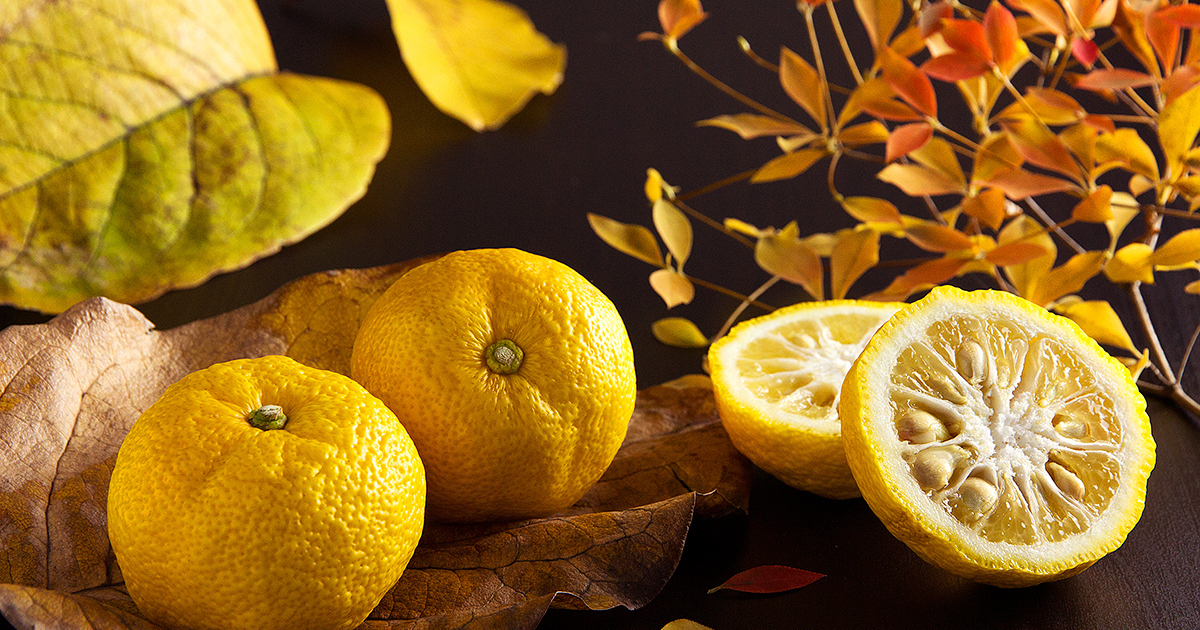5 Ways to Use Yuzu to Survive Winter in Japan

In Japan, the citrus fruit yuzu brings a burst of brightness that cuts through the longest night of the year: the winter solstice.
Although the daylight fades earlier and earlier each day as we get deeper into winter, when the sunshine-yellow yuzu (Japanese citrus) hits the supermarket shelves, it’s hard not to get excited. Its cheery color, energizing scent and immune-boosting properties make yuzu the natural choice to remedy a variety of winter woes.
Traditionally, the winter solstice is celebrated by taking a yuzu-steeped bath that perfumes the entire room with an invigorating aroma—a practice that dates back to the Edo period. But the fruit also makes an appearance in Japanese cuisine; for example in yuzu cha (yuzu tea), a popular sweet tea made with yuzu preserves. Here, we’ve compiled five ways to use this seasonal fruit to survive and thrive during winter in Japan.
1. Take a Yuzu Bath
Yuzu baths have been practiced since the Edo era, when sento (public bathhouses) started using the fragrant fruit to appeal to customers. It was said that taking a yuzu bath helps prevent colds by promoting blood circulation and warming the body, so it became a common practice on the winter solstice—the darkest day of the year in the northern hemisphere. The yuzu bath also serves another purpose. Strong scents are said to ward off evil spirits (also why incense is burned at Japanese temples and shrines), so a yuzu bath purportedly purifies the body.
The whole yuzu fruit can be added to your bath as is, but to maximize the aroma you’ll want to pierce the skin first. Take a knife and score the skin down through the pulp of the fruit. Plop them in your bath and gently squeeze the fruit in the water. For easier cleanup, put the yuzu in a net bag and spare yourself the hassle of dealing with pulpy aftermath. You can also reuse the yuzu and enjoy citrus-scented baths for the next couple of days.
2. Warm up with Yuzu tea or a “Hot toddy”
High in vitamin C, which helps support the immune system, yuzu is a nutritious and tasty addition to any hot tea. Simply mix a spoonful of yuzu preserves (sold at most supermarkets in Japan and can also be made at home) with hot water or your choice of tea. Drink with a spoon—the chewy, tender bits of preserved yuzu peel are the best part!
In the mood for an adult beverage? Whether you’re having a cozy night in or a festive winter celebration, a yuzu “hot toddy” (a hot citrus and spiced cocktail) fits the bill. While you can certainly use fresh yuzu juice or liqueur, below is an easy recipe that uses yuzu jam and a liquor of your choice. The yuzu preserves adds enough sweetness, so there’s no need for any other sweeteners.
- 1 tablespoon yuzu preserves
- 60 milliliters of whiskey or brandy
- 150 milliliters of hot water
3. Season Everything with Yuzu kosho
If you like heat, yuzu kosho (yuzu pepper) will be the MVP of your condiment collection. A paste made of just yuzu, chili peppers and salt; yuzu kosho is much more than the sum of its parts. Despite having minimal ingredients, it’s punchy and powerful, giving a spicy kick and bright citrus flavor to everything from hot pot to yakitori (chicken skewers).
Yuzu kosho can be enjoyed all year round, but its flavor is especially welcomed in winter soups and pot dishes like oden, making even the simplest of broths complex and addictive. Add a spoonful to your usual udon, ramen or hot pot to taste the difference as the mixture of chilies and yuzu warms your body to the core.
4. Garnish Dishes with Yuzu Peel
Yuzu peel can be used as a decorative and aromatic garnish for everything from simmered dishes to cocktails. Being a winter fruit, delicate strips of yuzu rind also often make an appearance in ozoni, the Japanese New Year mochi soup.
Every family makes their own version of ozoni. My grandparents do a miso version with thick, square pillows of kirimochi (cut blocks of mochi), a popular style in Japan’s Kansai region—though funnily enough, they are from Yokohama in the Kanto region, where most families are partial to a clear, soy sauce-based ozoni soup. Regardless of the style, a yuzu garnish is a welcome addition to the traditional soup, adding cheerful color, extra nutrition and a zesty aroma.
5. Make a Fragrant Yuzu simmer pot
Citrus has long been used in aromatherapy, with some claiming that the uplifting scent has a soothing effect; helping to ease stress, increase alertness and boost energy. And couldn’t we all use a bit more of that this winter? Take advantage of these benefits—or simply make your home smell delicious—by heating up a yuzu simmer pot. Also known as “stovetop potpourri,” it’s an all-natural alternative to candles or incense that also doubles as a makeshift humidifier in the dry winter months.
To make your yuzu simmer pot, slice up some yuzu and plop it into a pot of simmering water along with any other fruit, spices or herbs of your choice. For example, oranges and apples help amp up the sweet and fruity scent; ginger, cloves and cinnamon contribute a warming spice; and mint and rosemary give off a clean and fresh aroma. When the water level runs low, just pour in a bit more to keep it going. You can keep refreshing the simmer pot and enjoy the spa-like aroma for the next couple of days.
With these tips, keep warm and enjoy the uplifting aroma and flavor of yuzu during the winter solstice and throughout the season. Brighter days are ahead!


























